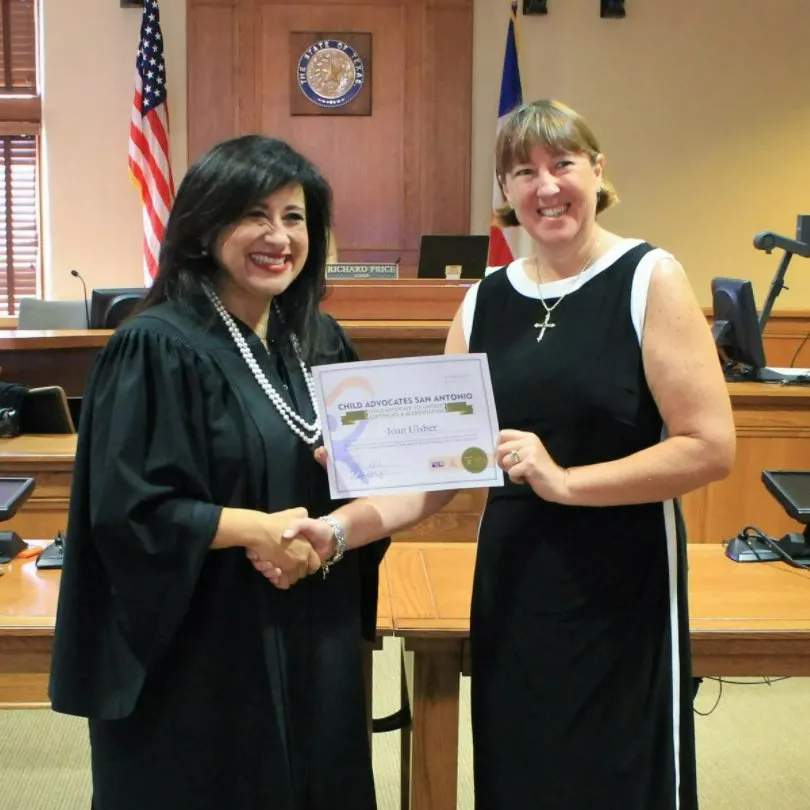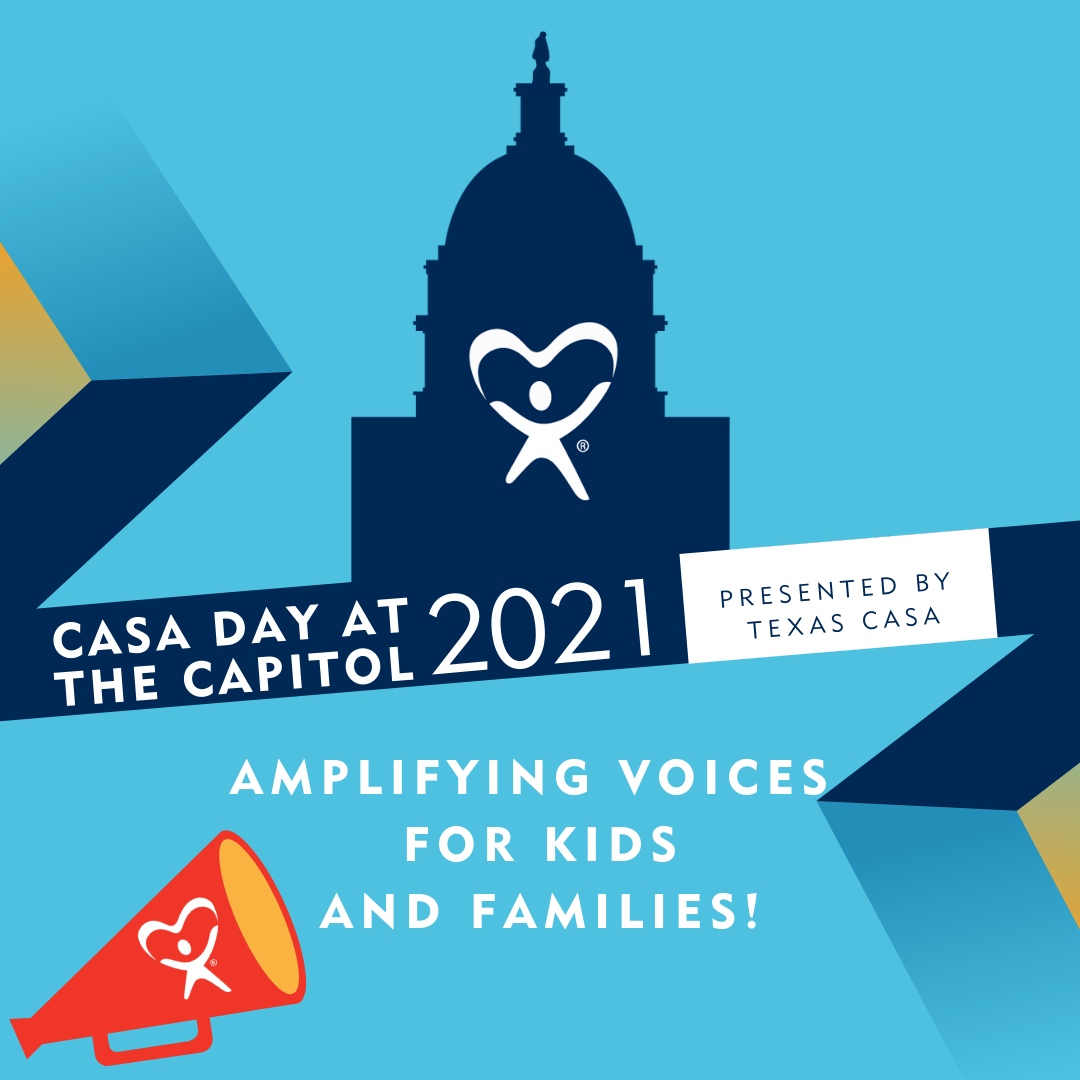CASA at the Capitol | March 2021
CASA- San Antonio Legislative Advocacy Team
Each year during the legislative session CASA advocates from all over the state come together to speak as one for Texas children and families. It is an opportunity for CASA programs and advocates, to share personal stories of advocacy while discussing legislation priorities that can impact the lives of children and families in our communities.
Child Advocates San Antonio has participated in this event in the past, but never before with our own official Legislative Advocacy Team or LAT, headed up by amazing advocate Joan Ulsher working directly with our local lawmakers. Out of 72 CASA programs covering 219 Texas counties, Child Advocates San Antonio became the 39th inaugural LAT to organize at the beginning of this year. The LAT is a combination of staff and volunteer advocates that advocate for children and families on a larger platform year-round. As constituents, we give “perspective” to issues that we face as advocates on a daily basis. Our lawmakers need to hear these stories.
This year, Representative Ina Minjarez, representing District 124 in San Antonio, introduced House Resolution 50 declaring February 17, 2021 as CASA Day at the Capitol. It was a 2-day virtual event at the Capital that unfortunately, due to the 2021 Texas winter storm, most CASA programs all around Texas were forced to cancel their meetings with their local government. Although we could not participate as planned, CASA Day at the Capitol remains important to our CASA network and thus we have rescheduled our local meetings.
We encourage all our CASA advocates in San Antonio to consider how you can be part of this team effort. This will ensure that child welfare remains a priority for our lawmakers and that all voices are heard. You have stories to share during your time as a warrior for these kids. These stories help show the importance of child welfare and CASA’s role in it. Here are a few ways you can get involved.
Check out the Texas CASA Program Portal on legislative advocacy: https://texascasa.org/program-portal/public-policy-legislative-advocacy/
- Watch the 5-part Webinar series on LAT
- Review the resources provided, especially the Legislative Advocacy Guide
- View the Rock the Capitol video event
- Become familiar with the Texas CASA priorities and important Bill’s we are tracking at: https://texascasa.org/what-we-do/leadership-in-public-policy/bill-tracker/
- Speak with your CASA Supervisor and let him/her know of your interest in joining our efforts for the next legislative session.
As we continue to move towards serving 100% of the children in Bexar County, we need more people willing to step up and speak out at the legislative level. Caring about the child welfare system is easy, making a difference takes everyone’s voice!
For more information on how to get involved and join the Legislative Advocacy Team contact Emilio Arriola at earriola@casa-satx.org or call our office at 210-225-7070.

In November 2025, Child Protective Services received a referral involving two sisters, ages 13 and 14, who were found caring for themselves. Following the death of their father, the girls experienced ongoing abuse and neglect. They were living in unsafe and unsanitary conditions, frequently left alone without adequate food, functioning plumbing, or consistent supervision, and were exposed to strangers regularly coming in and out of the home. Shortly after removal, Tameka Woolfolk was appointed as the Advocate on the case. From the very beginning, Tameka became one of the few consistent and reliable adults in the girls’ lives. The children experienced and continue to endure placement changes. These frequent transitions created ongoing instability and further complicated the girls’ ability to heal and adjust. Throughout each move, Tameka remained steadily involved, working diligently to ensure that the children’s services and support continued without interruption. She supports the girls not only emotionally, but physically as well helping pack their belongings at each move, accompanying them during school tours, and remaining readily available whenever they need support. Neither child was initially aware that they had the right to speak directly with the judge. Tameka recognized the importance of their voices being heard and with the support of the Ad Litem, helped to facilitate their presence at court, requesting that the judge meet with the girls in a breakout room, so they could personally express their wishes, all with the department, CASA and the Ad Litem by their side. In addition, this case was referred to Collaborative Family Engagement (CFE). During CASA’s ongoing exploration for family connections alongside the Department, Tameka discovered the children’s father’s obituary. Through this discovery, it was learned that the girls’ father had served in the United States Army as a combat medic during the Vietnam War and later worked for 30 years in civil service. Tameka took the initiative to request documentation, including VA records and a death certificate, to determine whether the children might be eligible for survivor benefits. The obituary also revealed that the girls are two of fourteen siblings. While many of the siblings were unable to provide support, CASA and the Department were able to establish contact with one brother. Through Tameka’s strong collaborative relationship with the Department and the Attorney Ad Litem, a thoughtful and appropriate plan was developed to allow the girls to begin visits with their brother, his wife, and their cousins. Although this story is still unfolding, both girls know one unwavering belief, that no matter what comes next, they know that Miss Tameka will continue to stand beside them every step of the way.









